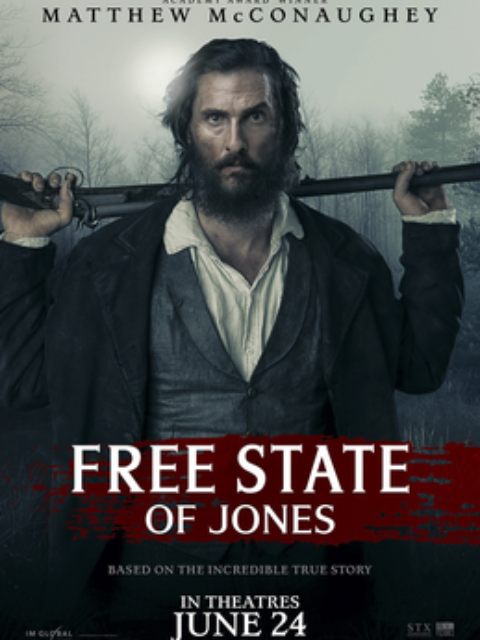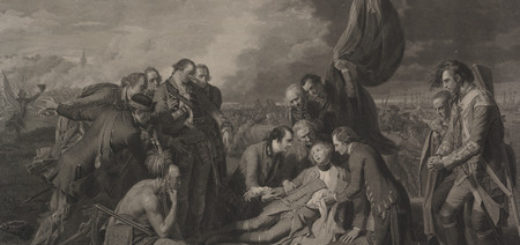Black Like Me: Free State of Jones
Thanks to @lordbyron080808 for taking a look at a new film from his unique perspective!
Black Like Me: Free State of Jones,” Eric Foner’s “Reconstruction,” and the Transformation of the Hollywood “White Savior” Complex

Have you ever had to read a thick, 600-paged, academic tome for some class assignment say perhaps, Eric Foner’s “Reconstruction: America’s Unfinished Revolution 1863–1877,” but hesitated, dreaming aloud that you wish there were a movie that you could watch in two and a half hours that summed up the basic bullet points of the book instead of having to spend days reading boring academic writing? Well, thanks to director, Gary Ross, (a self-admitted fan of Foner’s scholarship) your wish is granted by the recent appearance of the Civil War era film, “Free State of Jones.” As a freebie, it even stars that hunky Texas slacker, Matthew McConaughey.
Before you ditch the book, however, grab your keys, and fist-pump the air mouthing aloud the immortal dude-bro anthem, “Alright! Alright! Alright!”
This granted wish, as age-old tradition would have it, comes with a few important (and restrictive) caveats. Firstly, while this film does have a few Hollywood embellishments in it, it is not a “Hollywood” film. There is little historical or cultural exposition to be found in it. The movie assumes not only that you took the first part of high school American history, (you know, that part that goes from Colonial America until just after the Civil War.) But it also takes for granted that you generally still remember and understand it.
And despite being a “summer” movie, the film refuses to offer the sublime gratuity of overwrought epic set battle pieces. While there are more than a few battle scenes depicted, nearly all are presented as small, intimate skirmishes between a few dozens individuals, the fate of whom the audience has been led to care for. This production does not resemble Ted Turner-financed “Gettysburg” (1993) or even the Ken Burns’ documentary, “The Civil War” (1990.)
Moreover, the movie offers little in terms of the emotional or psychological development of its characters. The various characters, both good and bad, reveal very quickly who they are, and what they are about. While the film’s acting is above average, and McConaughey’s and his fellow actors’ portrayals are quite solid, the screenplay lacks deep emotional development, especially for a movie which hopes to transform the way that many people regard a central moment in our national history. The movie is essentially a fairly one-dimensional morality play about the necessity of racial and economic justice. To be fair, however, the original “Star Wars: A New Hope” was similarly one-dimensional, even if it had light sabers and the “Millennium Falcon.”
Additionally, in order to make the moral lessons concerning racial and economic equality palatable to much of American society, the narrative centers around the heroic and historic exploits of the white anti-Confederate rebel, Newton Knight (McConaughey,) who as a yeoman subsistence farmer in rural Mississippi serving as a medic at the battle of Corinth (1862) deserts after witnessing the death of his cousin and learning of a new Confederate policy allowing rich slaveholders an exemption from frontline military service. Given that the movie explicitly purports to explain Knight’s history of resistance to the Confederacy, on the surface, this decision seems appropriate and common-sensical. It is, after all, his story, and he just happened to be a white man.
However, both the basic narrative framing techniques that the story employs and the fact that the last 45 minutes of the movie revolves around Knight’s Black allies’ attempt to acquire equal status in the stifling and violent Reconstruction era South serve to draw critical attention to Knight’s role as the more and more critically discredited role of “white savior,” a longstanding trope in American literature and cinema.
Director Gary Ross frames “Free State of Jones” around the interrelated events of two different eras of the Knight family saga, the first, Newton’s own from 1862-1877, and that of the trial for “miscegeny,” or “race mixing” of his great-grandson, Davis Knight, whose case hinges not on his paternal heritage, but strangely, on his maternal one.
Even though it never openly claims so, (and in spite of spending a great deal of film time attempting to establish a commonality between the economic interests of Blacks and poor Southern whites,) the film’s primary interest is to accomplish filmically what Foner scholarship did for Reconstruction studies, that is to re-center our critical gaze away from, as I have written elsewhere:
[A] baleful discussion of poor Southern whites’ attempt to “redeem,” themselves from the terribly unfair and melodramatic burden of military failure and economic and social predation by both external “Carpetbaggers” and internal traitors, the “Scallywags.
This film attempts instead to reorganize our understanding the place of African-Americans and their interests in the Civil War and its aftermath from their historically peripheral status to that of crucial and central ones. Thus, Knight, and his descendants, are not merely educated by (and temporarily adopted into) the Black struggle for social and political rights, they are legally assimilated as members of the Black community. The film, thus, employs the “white savior” trope so common in Hollywood discussions of race, and then subverts it in startling and unconventional ways. The Hollywood “white savior” has become “African(-American)” in a manner that Tarzan never quite achieves.
So, if you are prepared to see your culturally-determined expectations of what a “war film” should be overturned and replaced with a less grandiose, and decidedly more academically justifiable, depiction of the Civil War and its cultural and social aftermath, (or to appropriate and adapt one of McConaughey’s quaint public expressions,) If “[you] don’t want to just revolve. [If you] want to evolve. As a man, as a human, as [scholar,] a lover,” then go see this movie. It may be a little slower and a little more academic than you’re used to, but it is definitely worth the effort.
@lordbyron080808 is graduate of The University of Texas-Austin with advanced studies in French and English literature. He lives in Austin and enjoys reading, discussing history and current events.






















